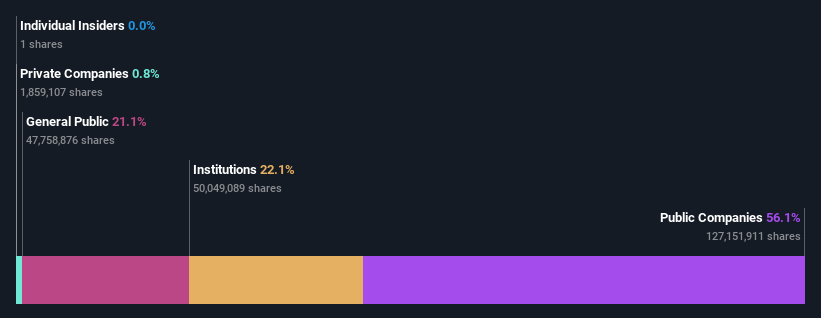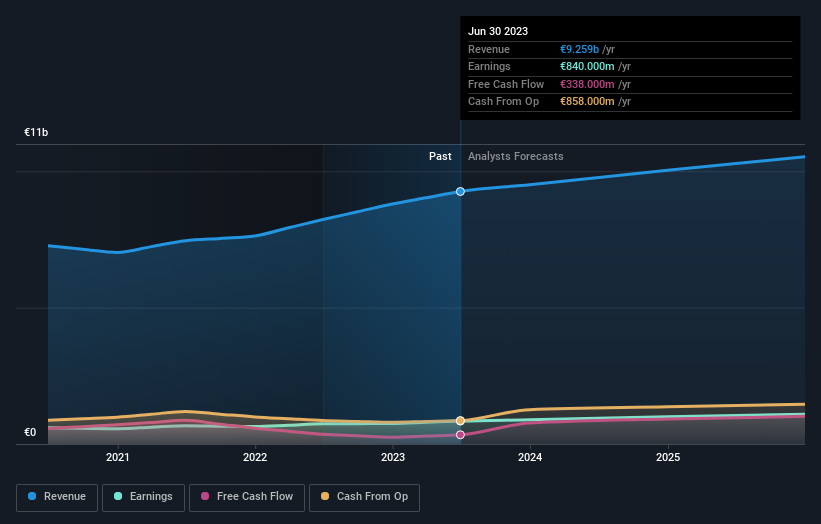Beiersdorf Aktiengesellschaft's (ETR:BEI) top owners are public companies with 56% stake, while 22% is held by institutions
Key Insights
The considerable ownership by public companies in Beiersdorf indicates that they collectively have a greater say in management and business strategy
The largest shareholder of the company is Assicurazioni Generali S.p.A. with a 56% stake
If you want to know who really controls Beiersdorf Aktiengesellschaft (ETR:BEI), then you'll have to look at the makeup of its share registry. We can see that public companies own the lion's share in the company with 56% ownership. That is, the group stands to benefit the most if the stock rises (or lose the most if there is a downturn).
Meanwhile, institutions make up 22% of the company’s shareholders. Large companies usually have institutions as shareholders, and we usually see insiders owning shares in smaller companies.
Let's delve deeper into each type of owner of Beiersdorf, beginning with the chart below.
View our latest analysis for Beiersdorf
What Does The Institutional Ownership Tell Us About Beiersdorf?
Many institutions measure their performance against an index that approximates the local market. So they usually pay more attention to companies that are included in major indices.
We can see that Beiersdorf does have institutional investors; and they hold a good portion of the company's stock. This can indicate that the company has a certain degree of credibility in the investment community. However, it is best to be wary of relying on the supposed validation that comes with institutional investors. They too, get it wrong sometimes. When multiple institutions own a stock, there's always a risk that they are in a 'crowded trade'. When such a trade goes wrong, multiple parties may compete to sell stock fast. This risk is higher in a company without a history of growth. You can see Beiersdorf's historic earnings and revenue below, but keep in mind there's always more to the story.
Hedge funds don't have many shares in Beiersdorf. Looking at our data, we can see that the largest shareholder is Assicurazioni Generali S.p.A. with 56% of shares outstanding. This essentially means that they have extensive influence, if not outright control, over the future of the corporation. BlackRock, Inc. is the second largest shareholder owning 3.2% of common stock, and Massachusetts Financial Services Company holds about 2.0% of the company stock.
While it makes sense to study institutional ownership data for a company, it also makes sense to study analyst sentiments to know which way the wind is blowing. There are plenty of analysts covering the stock, so it might be worth seeing what they are forecasting, too.
Insider Ownership Of Beiersdorf
The definition of company insiders can be subjective and does vary between jurisdictions. Our data reflects individual insiders, capturing board members at the very least. Company management run the business, but the CEO will answer to the board, even if he or she is a member of it.
Most consider insider ownership a positive because it can indicate the board is well aligned with other shareholders. However, on some occasions too much power is concentrated within this group.
Our information suggests that Beiersdorf Aktiengesellschaft insiders own under 1% of the company. Being so large, we would not expect insiders to own a large proportion of the stock. Collectively, they own €122 of stock. It is good to see board members owning shares, but it might be worth checking if those insiders have been buying.
General Public Ownership
The general public-- including retail investors -- own 21% stake in the company, and hence can't easily be ignored. While this size of ownership may not be enough to sway a policy decision in their favour, they can still make a collective impact on company policies.
Public Company Ownership
We can see that public companies hold 56% of the Beiersdorf shares on issue. It's hard to say for sure but this suggests they have entwined business interests. This might be a strategic stake, so it's worth watching this space for changes in ownership.
Next Steps:
It's always worth thinking about the different groups who own shares in a company. But to understand Beiersdorf better, we need to consider many other factors.
Many find it useful to take an in depth look at how a company has performed in the past. You can access this detailed graph of past earnings, revenue and cash flow.
If you are like me, you may want to think about whether this company will grow or shrink. Luckily, you can check this free report showing analyst forecasts for its future.
NB: Figures in this article are calculated using data from the last twelve months, which refer to the 12-month period ending on the last date of the month the financial statement is dated. This may not be consistent with full year annual report figures.
Have feedback on this article? Concerned about the content? Get in touch with us directly. Alternatively, email editorial-team (at) simplywallst.com.
This article by Simply Wall St is general in nature. We provide commentary based on historical data and analyst forecasts only using an unbiased methodology and our articles are not intended to be financial advice. It does not constitute a recommendation to buy or sell any stock, and does not take account of your objectives, or your financial situation. We aim to bring you long-term focused analysis driven by fundamental data. Note that our analysis may not factor in the latest price-sensitive company announcements or qualitative material. Simply Wall St has no position in any stocks mentioned.


